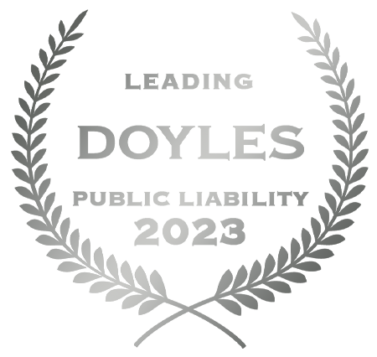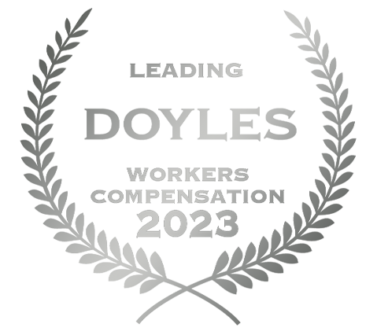
Knee Injury at Work – Compensation and Payout Guide.
If you’ve injured your knee at work by twisting and pivoting, repetitive kneeling, squatting, lifting heavy objects, or even just standing or walking for long periods on hard surfaces, compensation can pay your medical costs and cover your wages while you’re off work. You might think that you’ll automatically receive your full entitlements with a knee injury compensation claim. But it’s quite common for knee injury claims to be denied, or for you to miss out on additional lump sum payments that you’re entitled to.
If you’re about to make a claim or think you might be missing out on additional payments, read on to find out how to get all the knee injury compensation and lump sum payments you’re entitled to.

Claiming compensation for a knee injury at work – what you need to know.
If you’ve sustained a knee injury at work the first thing you need to do is visit your GP to have your injuries assessed and report your injury to your employer. Your employer should then report your injury to their workers compensation insurer.
Many people come to us needing help with one of these five common situations:
1. You’ve injured your knee but haven’t claimed yet.
If you’re having trouble knowing where to begin we can help you with your claim from start to finish.
2. You’ve injured your knee but you’re not sure if it was entirely work-related.
If, for example, you play sports like soccer or netball and were injured whilst playing, you might think that you can’t claim workers compensation. But you may still be eligible for workers compensation if your job aggravated or contributed to the knee injury. Our team can help with your specific situation.
3. You’re already receiving weekly benefits for your knee injury but want to know about additional entitlements.
This is a very common question. We find that many of our knee injury clients are entitled to lump sums they haven’t been told about.
4. You’ve had specific benefits for your knee injury denied or cut off.
This is also a common situation. We’ve had many clients come to us because they’ve had essential knee surgery or treatment denied by an insurer.
5. Your knee injury was rejected.
Claims are often rejected on the basis that the knee injury wasn’t caused by a work accident or was a pre-existing condition. You may still be eligible for compensation if we can show that your job made an injury you already had worse.
Whether you’re about to submit a claim or you fall into one of these five categories, read on to learn how to get your full entitlements.
What compensation can I claim for my knee injury?
If you’ve injured your knee at work in NSW and you make a claim for workers compensation, the following table shows what you may be eligible to claim:
| Workers Compensation Payments NSW | Description |
| Weekly payments | These are payments to compensate you for lost income while you’re off work recovering from your knee injury. |
| Medical expenses | Payment of your medical, hospital, ambulance, rehabilitation (including home help) and travel expenses. |
| Permanent impairment payout | A lump sum compensation payout to cover a permanent impairment as a result of your knee injury. |
| Work Injury Damages payout | Also known as a common law claim, this is a lump sum payout for damages if your knee injury was caused by your employer’s negligence. |
Permanent impairment and work injury damages for knee injuries are not paid to you automatically; you need to apply for them separately, even if you’re already receiving weekly benefits.
Call 13 15 15 or chat to us now for free advice
Chat nowFind out how much you can claim.
Get startedCommon knee injuries that qualify for workers compensation settlements / payouts.
We’ve settled thousands of workers compensation knee injury claims. Here are seven of the most common enquiries and claims. On their own these knee injury claims generally qualify for weekly benefits, but when they’re coupled with other injuries they can result in more significant lump sum payouts.
ACL tear workers compensation settlements.
An anterior cruciate ligament (ACL) tear is one of the most common knee injuries. It involves tearing the ligament in the knee. It can occur during a variety of work-related activities that require sudden stops or changes in direction. You may need physiotherapy or surgery for this knee injury which would qualify for workers compensation.
Meniscus tear workers compensation settlements.
The meniscus is a piece of cartilage in the knee that acts as a cushion between bones. A tear in the meniscus can happen due to twisting, a direct blow to the knee, lifting heavy objects incorrectly or repetitive strain on the knee joint. In some cases surgery may be required to repair or remove the meniscus which would be eligible for workers compensation.
Patellar Tendonitis workers compensation settlements.
Also known as “jumper’s knee,” this injury involves inflammation or irritation of the patellar tendon. In the workplace you could get workers compensation if this was caused by actions such as repetitive bending of the knee, squatting, or standing and walking on hard surfaces for long periods of time.
Patellar Dislocation workers compensation settlements.
The patella (kneecap) can sometimes be forced out of its normal position by sudden movements and lifting heavy objects. This can cause pain, swelling, and instability in the knee joint. You might need rest, physiotherapy, or even surgery, all of which are eligible for workers compensation.
IT Band Syndrome workers compensation settlements.
The iliotibial (IT) band runs along the outside of the thigh and can become inflamed, leading to pain on the outer part of the knee. You could still be eligible for workers compensation even though it could be caused by simply sitting or walking for prolonged periods of time.
Bursitis workers compensation settlements.
Knee bursitis happens when small fluid-filled sacs (bursae) that cushion the knee joint become inflamed. It’s often caused by overuse, repetitive motions and poor ergonomics in the workplace. You could receive workers compensation to cover your treatment costs for this.
Patellofemoral Pain Syndrome workers compensation settlements.
This is pain in the front of the knee, often caused by issues like muscle imbalances or problems with the alignment of the kneecap. These can be caused by long periods of sitting and poor ergonomics at work. Physiotherapy is the most common treatment for this condition, which is covered by workers compensation.
What’s the average payout for a knee injury at work?
In the 12 months to February 2024, 113,709 workers compensation claims were submitted in NSW, and $5.8 billion was paid out in benefits and lump sums. That’s $51,007 paid out for every new claim submitted.*
However, knee injury claims are likely to be higher than the average claim if they involve significant time off work or surgery. For example, one of our clients had a knee and calf injury that required surgery and was caused by employer negligence resulting in a knee injury payout of $350,000 (see example below).
*According to SIRA Open Data, May 2024
Knee injury payout example: Worker hit by a falling object awarded $350K payout.
In 2018 Callum*, a fitness store worker, was hit in the back of the leg by a pull-up bar pack which fell from a display stack behind him whilst he was assisting a customer with free weights.
Scans revealed he had suffered a ruptured calf muscle and a ruptured popliteal ligament (back of the knee). He was given a moon boot to wear and eventually returned to work. However, he experienced constant pain and was eventually advised, after further scans, that he needed surgery. This was refused by his employer’s insurance company.
After contacting Law Partners, his lawyer, Natalie, quickly got his claim proceeding and had the insurer’s decision overturned. Although the surgery helped, Callum continued to have pain and other problems. Natalie succeeded in proving his employer was negligent and that Callum had permanent impairment of 19%, which resulted in him receiving a lump sum payment of $350,000.
*Name has been changed to protect our client’s identity
What’s the average settlement for knee surgery workers compensation?
We’re often asked this question. You can see from the example above that our client received a settlement of $350,000 for an injury that required knee surgery. However, there’s no way to accurately predict the average settlement for knee surgery workers compensation because settlement amounts depend on factors like your age and capacity to return to work after surgery.
Also, as you can see from the example above, if the work accident was caused by employer negligence and there’s a work injury damages claim or permanent impairment this can add literally hundreds of thousands to the settlement.
Call 13 15 15 or chat to us now for free advice
Chat nowFind out how much you can claim.
Get startedCan I claim a lump sum for my knee injury?
There are two ways you may qualify for lump sums:
Permanent impairment lump sum – you can claim this if your permanent impairment rating is assessed as 11% or more.
Many people with knee injuries miss out on permanent impairment lump sums because they don’t meet the impairment rating threshold of 11%. But if your assessment wasn’t done correctly and fails to consider the full impact of your injury, or other related injuries, you could be entitled to this lump sum.
Work injury damages – a lump sum payout for damages if your knee injury was caused by your employer’s negligence.
To make a work injury damages claim for a knee injury, you need a workers compensation lawyer with experience in knee injury claims to build the evidence that your employer’s negligence caused your accident.
If you think you’ve missed out on a lump sum you’re entitled to (for example, your permanent impairment wasn’t assessed correctly) or you need help with your knee injury claim you can call 13 15 15 for free legal advice.
Common questions and answers on knee injury workers compensation.
- Knee injury claims should generally be submitted within 6 months
- This can be extended to 3 years in certain circumstances
- This can be more than 3 years if it relates to an injury resulting in serious and permanent impairment
- If a period greater than 3 years has passed since the accident then a claim may still be made with SIRA approval
Firstly, you need to see your GP to identify the cause of your knee pain. Once you have a diagnosis, you’ll need to prove that your work caused the injury or was an aggravating factor to be eligible for workers compensation.
If you can’t work at all, you may be eligible for an additional lump sum through your superannuation. Most Australians are covered, although many don’t know they have this insurance included in their super.
If you’re not sure whether you’re covered, you can call 13 15 15 and we’ll find out for you. It’s a free service.
There are ways we can challenge the insurer’s decision for you if your knee injury claim is denied. Our team has a strong track record in getting claim denials overturned and you can get free legal advice on your options by calling 13 15 15.
Knee injury workers compensation lawyers.
Knee injury claims can be complex. In many cases, knee injuries lead to other complications, and some can get worse over time. It’s really important that your injuries are assessed, and your claim is prepared thoroughly to make sure you receive all the compensation you’re entitled to.
At Law Partners, we take time to get to know you personally. We look at what your life was like before your knee injury, then we look at what’s changed. It’s this more personal approach that’s enabled us to win more compensation for our clients. We work on a no win no fee basis, and we win over 99% of our cases.

Chantille Khoury
Principal
A Doyle’s Guide listed personal injury law professional and one of the country’s preeminent workers compensation specialists, with over 15 years’ experience in delivering optimal outcomes to injured Australians.











